Throughout 2024, California Sea Grant is showcasing our State Fellowship, which places graduate students in 12-month paid roles with the agencies and organizations that plan, implement and manage ocean policies and programs in California. This month, the fifth and last in the series, we’re highlighting fellows working at several agencies along the Northern Coast.
California State Coastal Conservancy
Eleanor Bent
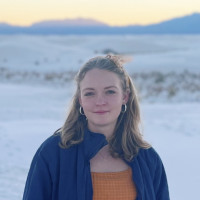
As a child in New York City, Eleanor Bent had “a special fascination” with sharks. But as she grew older, a growing awareness of the sad state of the ocean nudged her away from her childhood dream, marine biology, toward something more interdisciplinary.
As an undergrad at Cornell, she majored in “biology and society.” Looking at the human contribution to the ocean “helped me to feel a little bit less depressed,” she says, “by thinking about what strategies could be used to address these huge, daunting problems.” After graduation, though, she wasn't sure where to head next. A detour as a public school teacher in the Bronx, and seeing how some of her students’ eyes lit up when she talked about the ocean, steered her back toward conservation. It also steered her to California, where Bent received a master’s degree at the Middlebury Institute of International Studies in Monterey, California.
As a fellow, Bent split her time between the California State Coastal Conservancy and an associated agency, the San Francisco Bay Restoration Authority, working on a wide range of projects — “plugging in at every point in restoration project development,” she notes.
That meant occasional site visits to check on funded projects — trails, wetland restoration, public access improvements. "I got to explore parts of the Bay Area I never would have seen otherwise," she says. But more importantly, she learned how funding shapes conservation; one major project involved analyzing where restoration funding had — and hadn't — reached low-income communities around the Bay. "When you’re deciding where the money goes, you're deciding where the power goes,” she says.
That perspective has become a useful experience now that she's wrapped up the fellowship early to take a role as a program assistant with the Marine Conservation Institute, which helps develop marine protected areas across the world. “It’s been so great seeing the funding process from both sides of the desk,” she notes.
California Fish and Game Commission
Devon Rossi
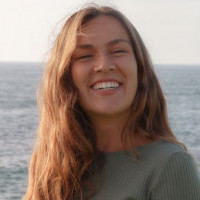
In 2023, the California Fish and Game Commission received 20 petitions from members of the public suggesting potential changes to the state’s system of Marine Protected Areas, including 80 proposed individual actions. California Sea Grant State Fellow Devon Rossi has delved into this well of impassioned feedback. Even two years later, “a timeline horizon for completing reviews of all petitions is nowhere in sight,” she says.
Not that that’s a problem. Rossi — who’s loved the coast since her childhood days of ocean kayaking near San Diego — found herself focused on a particular question during her master’s studies at the University of California, Santa Barbara: understanding how people respond to different kinds of ocean policies.
In her role as a fellow, Rossi assists the Commission’s Marine Advisor in coordinating between the Commission and other state agencies involved with MPAs and prepares staff summaries for meetings, synthesizing public comments and materials from the California Department of Fish and Wildlife down to the key information they need to know. She's also taken on a separate extension project with California Sea Grant on DDT, a highly damaging insecticide, which led to her serving as a co-moderator at a panel discussing the impacts of the chemical on marine life.
“What I’ve learned in this fellowship, most of all,” she says, “is how to listen to people from different backgrounds.” The Commission works with commercial fishermen and recreational fishermen, and its meetings provide an opportunity to ensure their voices are "heard and respected at meetings just as much as a scientist or a paid conservation advocate." That's crucial for the future of California's coast, she notes, where conservation has to serve so many different needs.
State Water Resources Control Board
Bobby Hyla, Division of Water Quality - Seawater Desalination Unit
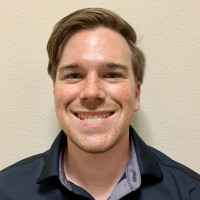
As an undergraduate at Cal State Long Beach, Bobby Hyla noticed that the grad students he admired in his laboratories often went on to join the California Sea Grant State Fellowship. So, after completing his master's in conservation and restoration science at the University of California, Irvine, Hyla followed suit. "I knew it would help me toward my goal of making my research applicable to the challenges we face," he says.
Now he's tackling a serious challenge: securing California's water supply in the drier years to come. The State Water Resources Control Board, the primary agency responsible for managing California's water resources and water quality, is proposing amendments to the state’s Ocean Plan to regulate desalination. Hyla has served in an information-gathering role, analyzing past mitigation requirements for desalination facilities and studying how other agencies engage with disadvantaged and low-income communities, seeking to understand how the Water Board might incorporate equity into its approach. His research has revealed how historically water access has profoundly shaped—and often divided—California's communities.
"We're really in the Wild West with desalination policy," Hyla notes. "We're trying to ensure that it's done in the most responsible way possible, while also allowing for new technologies and innovation. We have to find a balance. People need water, and we're also working to maintain environments that are sustainable and healthy for the future."
Before the fellowship, Hyla had focused more on scientific research than policy. But he soon found the overlap. "They're both just puzzles," he says. "We don't have all the pieces and we're trying to figure out what we're missing." His research background has proven to be an asset, helping him bridge conversations between scientists, policymakers and communities affected by California's water challenges — work that he envisions doing for years to come.
Beverly Scharnhorst, Division of Water Quality - Ocean Standards Unit
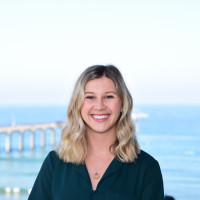
A few years into her first career in the aerospace industry, working with suppliers to secure airplane parts, Beverly Scharnhorst had a revelation: “This is not my passion,” she remembers thinking. “I wanted to do something more rewarding.”
She thought back to her childhood, spent two blocks from California’s coast, and her college job at Sea Life Aquarium, where she’d loved teaching visitors about marine conservation. That led her to a one-year master's program at the Scripps Institution of Oceanography. There, she found herself drawn to the work of the State Water Resources Control Board. “I thought this would be a good place to take my previous experiences, especially in project management, to help the state manage its resources,” she says.
At the SWRCB’s Ocean Standards Unit, Scharnhorst works to ensure that coastal waters are clean — working, for example, with the state’s Ocean Protection Council to determine whether areas protected for water quality should count toward California’s goal to conserve 30% of the state’s land and waters. She’s focused especially on developing a survey to see how the public perceives various water quality standards and plans. She’s also worked with coastal counties to ensure they receive sufficient funding to monitor their beaches.
“Every day is a bit different,” Scharnhorst notes. The constant, though, is her team. "I'm a fellow, but they treat me as a full-blown colleague." Now she hopes to continue her work in the field — completing her transition from business to marine resource management.
Elena Suglia, Office of Information Management and Analysis
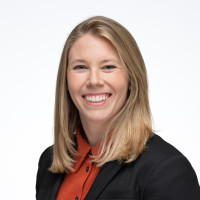
When Elena Suglia began her doctoral studies at the University of California, Davis — focused on how one native California wildflower responded to climate change across an elevation gradient — she figured she was on a path into academia. But she also found real meaning in an internship in the dean’s office, where she advised on diversity policy.
“After grad school, I decided I wanted to bring those interests together,” Suglia says. “How can I do science and policy and equity work at once? And I’m doing that now.”
A key step was the California Sea Grant State Fellowship, which sent her to the State Water Resources Control Board's unit focused on surface water ambient monitoring. Suglia has juggled more than a half-dozen projects at once, from making the state's safe-swimming map more user-friendly to collecting environmental DNA in the field. One key project has been revamping the state's bioaccumulation statewide monitoring program, which tracks toxins like mercury in fish, to better serve disadvantaged communities and tribes — ensuring both data collection and communication methods align with these communities' needs.
The placement was a good fit, from both sides, and Suglia is now working in a full-time position as an environmental scientist in the same unit. “Everyone here is so enthusiastic about finding innovative solutions,” Suglia says, noting that California’s policies are often emulated elsewhere. Countless decisions will need to be made in the coming years, “and the Water Board will help guide those decisions,” Suglia says. “I can’t think of a better group of people to be working on these issues.”